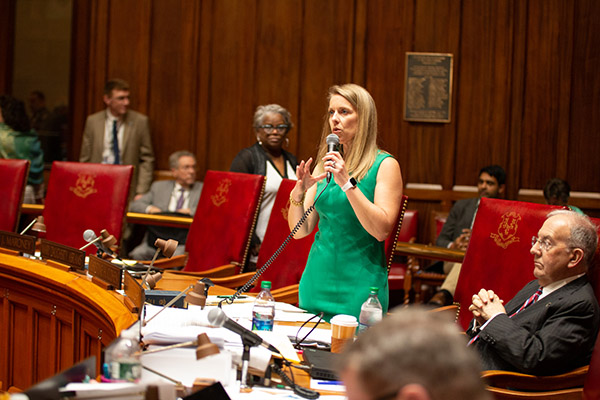Sen. Cohen Supports Senate Passage of Bans
on Fracking Waste and Offshore Drilling

HARTFORD, CT – Today, state Senator Christine Cohen (D-Guilford) brought two important Environment Committee bills onto the state Senate floor — statewide bans on fracking waste and offshore drilling. Each bill advanced out of the state Senate by a unanimous vote and now await action by the state House of Representatives and a signature from Governor Ned Lamont to become law.
“I am pleased to see these bills pass the state Senate and head to the House,” said Sen. Cohen, who is also Co-chair of the Environment Committee. “Both offshore drilling and fracking waste wreak havoc on marine wildlife and waterways and pose a major threat to the state’s shoreline. Banning offshore drilling and fracking waste will protect the health of our state’s citizens, environment and marine wildlife.”
Offshore Drilling Ban
Senate Bill 588, “An Act Prohibiting Off-Shore Drilling For Oil And Gas In Connecticut,” will ban drilling for oil or gas, whether exploratory or otherwise, statewide. SB 588 also bans using sound wave technology to locate and map rocks and other geological formations that may contain oil or gas to facilitate exploring or drilling for oil or gas, referred to as seismic mapping.
This legislation will also prohibit all state agencies, including the Department of Energy and Environmental Protection, from issuing or approving a permit, lease, contract, or conveyance for, or relating to, drilling for oil or gas or seismic mapping in state waters.
According to Oceana, an international organization which works to protect and restore oceans across the World, pollution caused by offshore drilling negatively effects marine and other wildlife. There is also a risk of catastrophic spills and blowouts. According to the Connecticut Audubon Society, offshore drilling causes severe harm to the Long Island Sound, putting thousands of sea and coastal birds at risk.
The Connecticut League of Conservation voters provided public testimony in favor of this legislation stating that spills from offshore drilling harms our water supply, beaches and will hurt coastal businesses. They also testified that the loud sounds caused by seismic mapping, confuses animals that communicate by similar methods and in some cases can cause permanent hearing damage. Prior to advancing out of the state Senate, this legislation was voted out of the Environment Committee by a bipartisan 27-2 vote.
Fracking Waste Ban
Senate Bill 753, “An Act Concerning The State-Wide Ban On Fracking Waste,” will expand upon the already implemented prohibition on certain activities involving fracking waste. Current law imposes a narrower ban that generally applies to accepting; receiving, collecting, storing, treating, transferring, and disposing of fracking waste until the Department of Energy and Environmental Protection (DEEP) commissioner adopts regulations to, among other things, control it as hazardous waste. DEEP has not adopted such regulations.
SB 753 permanently prohibits accepting, receiving, collecting, storing, treating, transferring, selling, acquiring, handling, applying, processing, and disposing of hydraulic fracturing (“fracking”) waste, natural gas waste, or oil waste in Connecticut. This legislation will also require anyone exploring for oil or gas to register with DEEP on a form the commissioner prescribes.
Hydraulic fracturing, or fracking, refers to the process of pumping fluid into or under the ground’s surface for purposes of fracturing rock to explore for, develop, produce, or recover natural gas. This legislation will broaden the definition by also applying it to oil and other subsurface hydrocarbons. The bill also provides that “waste from hydraulic fracturing” includes any substances that are associated with fracking.
According to the National Institute of Environmental Health Sciences, natural gas and hydraulic fracturing-associated chemicals can travel through cracks in the rocks and seep into underground drinking water sources, severely contaminating the water. This bill received support from Environment and Human Health Inc., which provided testimony stating that in states where fracking has taken place, groundwater has been contaminated, rivers have been polluted and it has put the health of people and animals at risk. Currently, New York, Maryland and Vermont have statewide fracking bans. This legislation received bipartisan support in the Environment Committee, passing 28-1.
Share this page:
